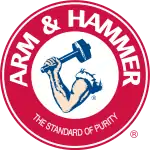Arm & Hammer
Arm & Hammer is a brand of baking soda-based consumer products marketed by Church & Dwight, a major American manufacturer of household products. The logo of the brand depicts the ancient symbol of a muscular arm holding a hammer inside a red circle with the brand name and slogan. Originally associated solely with baking soda and washing soda, the company began to expand the brand to other products in the 1970s by using baking soda as a deodorizing ingredient. The new products included toothpaste, laundry detergent, underarm deodorant, and cat litter.
 | |
| Product type | Baking Soda products |
|---|---|
| Owner | Church & Dwight |
| Country | United States |
| Introduced | 1846 |
| Markets | World |
| Tagline | The standard of purity |
| Website | armandhammer.com |
History

Name and logo
The original Arm & Hammer logo usage dates back to the 1860s. James A. Church, son of Dr. Austin Church, ran a spice business known as Vulcan Spice Mills. According to the company, the Arm and Hammer logo represents Vulcan, the Roman god of fire and metalworking.[1]
It is often claimed that the brand name originated with tycoon Armand Hammer; however, the Arm & Hammer brand was in use 31 years before Hammer was born. Hammer was so often asked about the Church & Dwight brand that he attempted to buy the company. While unsuccessful, Hammer's Occidental Petroleum acquired enough stock for him to join the Church & Dwight board of directors in 1986. Hammer remained one of the owners of Arm & Hammer until his death in 1990.[2]
Baking soda
Arm and Hammer started as John Dwight and Company in 1846 when John Dwight and Austin Church used their sodium bicarbonate in their kitchen. They formerly made the Cow Brand trademark on their baking soda. In 1886, Austin retired and his two sons succeeded in selling Arm and Hammer Baking Soda through their name Church and Co as a competing company to the John Dwight Company which continued selling Cow Brand baking soda. The Church & Dwight Company was formed when the two were merged.[3]
Odor control
In 1972, Arm & Hammer launched an advertising campaign promoting the idea that a box of baking soda in the refrigerator could control odors.[4] The campaign is considered a classic of marketing, leading within a year to more than half of American refrigerators containing a box of baking soda.[5][6] This claim has often been repeated since then.[7][8] However, there is little evidence that it is effective in this application.[9][10] Arm & Hammer further claims that the box must be replaced monthly.[11]
Armex
In 1986, Arm & Hammer created the Armex brand, a line of soda blasting agents originally used to aid in the conservation-restoration of the Statue of Liberty.[12]
Gallery
See also
References
- "History of Product Names & Trademarks: Arm & Hammer Baking Soda".
- "The Straight Dope: Did tycoon Armand Hammer have anything to do with Arm & Hammer baking soda?". 21 May 1982.
- "Timeline of Brand History - Church and Dwight". churchdwight.com. Retrieved 2018-10-01.
- "A trusted solution for more than 170 years. Pure and simple.", Arm & Hammer "About Us" page
- Keith Sawyer, Group Genius: The Creative Power of Collaboration, 2017, ISBN 0465093582, "keep food tasting fresh"
- Clayton M. Christensen , Scott Cook, Taddy Hall, Marketing Malpractice: The Cause and the Cure, Harvard Business Review, December 2005,
- Raymond J (June 10, 2016). "Kitchen Odor Eliminating Candles, Products, and Tricks". cravedujour.com. Archived from the original on August 7, 2020. Retrieved August 21, 2020.
- Vicki Lansky, Martha Campbell, Baking Soda: Over 500 Fabulous, Fun, and Frugal Uses You've Probably Never Thought Of, 2009, ISBN 1931863733, p. 28
- "Myth #100: An Open Box of Baking Soda in the Fridge absorbs Odors", Bruce Weinstein, Mark Scarbrough, Lobsters Scream When You Boil Them; And 100 Other Myths About Food and Cooking, 2011, ISBN 1439195382, p. 312
- "Baking Soda as Odor Absorber", Cooks Illustrated
- "ARM & HAMMER - About Us". www.armandhammer.com. Retrieved 2018-10-01.
- Times, Barnaby J. Feder and Special To the New York (16 June 1990). "Baking Soda Maker Strikes Again". The New York Times. Retrieved 2018-10-01.

.jpg.webp)
.jpg.webp)